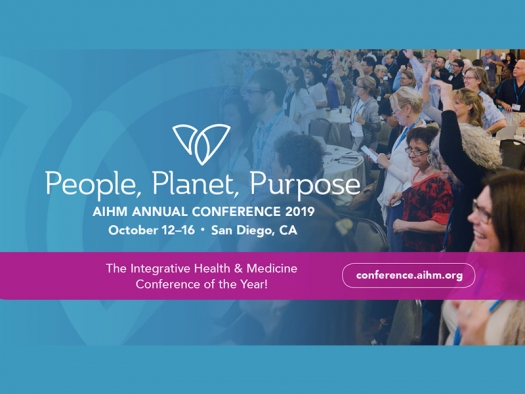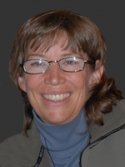People, Planet, Purpose
The Academy of Integrative Health & Medicine (AIHM) is an inter-professional membership association of diverse health professions working together to transform health care globally - body, mind, spirit, community and planet. Their mission is dedicated to engaging a global community of health professionals and health seekers in innovative education, leadership, inter-professional collaboration, research and advocacy that embraces all global healing traditions, to promote the creation of health and the delivery of evidence-informed comprehensive, affordable, sustainable person-centered care.
Following is a review a few of the presentations at the AIHM Conference held in San Diego, California, October 12-16, 2019.
The Transformative Power of Lifestyle Medicine
Dean Ornish, MD
We tend to think of advances in medicine as a new drug, laser, or surgical procedure, something high-tech and expensive. This presentation discussed the power of comprehensive lifestyle changes, reviewing more than 30 years of research using high-tech, state-of-the-art measures to prove the power of low-tech, low-cost, and often ancient interventions. Also, the lecture described proven strategies for motivating people to make and maintain comprehensive lifestyle changes as well as personalizing a way of eating and living based on an individual’s needs, genes, and preferences. Finally, the presentation described many of the health policy implications of comprehensive lifestyle changes as both medically effective and cost effective.
At the end of this session participants were able to:
- Recognize successful strategies for motivating people to make and maintain comprehensive lifestyle changes
- Describe the evidence from randomized controlled trials showing that chronic diseases such as coronary heart disease and prostate cancer may be stopped or even reversed by making comprehensive lifestyle changes
- Describe evidence showing that comprehensive lifestyle changes may affect gene expression
Metahuman
Deepak Chopra, MD
Is it possible to venture beyond daily living and experience heightened states of awareness? Deepak Chopra, the New York Times bestselling author of You Are the Universe, says that higher consciousness is available here and now. Chopra unfolded a path for waking up that allows all of us to realize our infinite potential.
At the end of this session participants were able to:
- Recognize that when you change how you view reality, reality changes
- Develop strategies to expand our consciousness in all that we think, say, and do
- Utilize practical ways to experience transformation and healing
Climate Change Solutions: Science, Spirituality & Policy
Veerabhadran Ramanathan, PhD
Renowned speaker Veerabhadran Ramanathan, PhD described how climate change has morphed into climate disruption; he projects that in about 10 years, climate disruption can impact the health of over one billion people. He shared his thoughts on practical solutions to the problem and the immediate need for action. Dr. Ramanathan highlighted the transformative role that health care providers can play in both protecting the health of the vulnerable population and for getting public support to help stabilize the climate in the coming decades.
At the end of this session participants were able to:
- Recognize the problem of climate change and the threat to public health as clinicians
- Describe the effects climate change has on public health and health outcomes
- Review and describe current research on climate change
Loss of Microbiome Diversity in Asthma & Allergic Disorders
Lalitha Padmanabhan Aiyer, MD, MS, MBA, FAIHM, ABOIM
During this session Dr. Aiyer discussed case-based, clinical and evidence-based approaches to identifying the role of microbial diversity and gut dysbiosis in the pathogenesis of asthma and allergic disorders. Participants learned how to identify the importance of the Gut-Lung connection, help patients maintain a healthy gut microbiome, and help patients avoid and eliminate the triggers for microbial imbalance to facilitate prevention and control of the progression of allergic disorders. Dr. Aiyer provided a practical approach to evaluating and managing patients by utilizing customized patient care. This approach included gut microbiome analysis, novel tests for profiling gut microbiota, and characterizing the dysbiosis, as well as tests to identify dietary allergens, environmental toxins, and micronutrient assays. Participants learned how to help patients restore and maintain healthy microbiome diversity by customizing patient care and integrating lifestyle modifications, dietary modifications, stress management, and detoxification.
At the end of this session participants were able to:
- Demonstrate the role of a healthy gut, skin, and lung microbiome in good health, and triggers leading to microbiome dysbiosis
- Demonstrate the link between loss of microbiome diversity and asthma / allergic disorders
- Describe an integrative approach to restore and maintain microbiome diversity
- Emphasize the key principles in prevention and management: Healing the gut, diet, eliminating triggers, environmental toxins, lifestyle and stress management
The Future of Food: Empowering Regenerative Organic Agriculture for a Human Health Revolution
Jeff Tkach
Rodale Institute was founded in 1947 with the conviction that healthy people need healthy food, and healthy food grows in healthy soil. The founders knew that organic agriculture was the essential piece in this equation. J.I. Rodale’s pioneering research developed practical, scalable solutions that allowed farmers to eliminate harmful contaminants and produce food that is healthier for people and the planet. Rodale Institute’s world-leading research defined the standards for organic agriculture, and innovative research, education, and outreach continues to reveal its full promise. In this lecture, Jeff Tkach, Chief Growth Officer at the Rodale Institute, guided participants through the benefits of regenerative organic practices, which not only maintains resources and inputs, but strengthens them. “If you focus on the soil and focus all your resources and energies on building the soil, resting it, watering it, recovering it, the outcome—it produces healthy food, but it’s more than that: it’s healthy people, says Tkach. “Our job as farmers is not to produce healthy food: it’s to produce healthy people.”
During this lecture, Tkach provided key insights into new Rodale Institute research initiatives, (including key findings from their 40-year Farming Systems Trial) which are proving that organic agriculture produces competitive crop yields, can reduce damage in drought years, improve water quality, and, of course, enhance soil health and human health. In addition, Jeff shared scientific insights into the connection between soil health and human health, including a glimpse into Rodale’s recently-launched Regenerative Health Institute. Equipped with this knowledge, doctors and medical professionals can create measurable change in their patients by embracing food as medicine.
At the end of this session participants were able to:
- Recognize (through grounded science and data) the connection between soil health and human health, and how this connection can be brought to life for a patient
- Utilize Rodale Institute’s groundbreaking research to more deeply understand the challenges of our nation’s food and farming systems, and how they impact human health outcomes
- Develop clear strategies for making dietary and lifestyle enhancements by leveraging non-toxic, organic food
Large Scale Agriculture and The Crossroads of Human and Planetary Health
Zach Bush, MD
The exponential rise in the prevalence of chronic disease in the developed world is staggering and threatens the financial and political stability of the developed nations around the world. In the US, 46% of our children now carry a chronic disease diagnosis. This is in stark contrast to the chronic disease burden of 4% in the US population (including all ages) in the 1960s. The conditions that are becoming prevalent today reflect damage to every organ system in the body, and include the autism spectrum disorders, attention deficit hyperactivity disorder, depression and anxiety, food allergies and sensitivities, environmental allergies, metabolic challenges like precocious puberty, abnormal reproductive development, diabetes, autoimmune conditions, and cancers. Research from around the globe suggests that a combination of genomic, autoimmune, nutritional, and environmental factors are now contributing to the collapse of health in our children and adults. Not surprisingly, the diseases in our domesticated animals – from pets to livestock – have followed a similar trajectory. While this may seem overwhelming, the fact that each of these systems seemed to collapse at the same time in the timeline would suggest that there is a root cause event that has set off the cascade of systemic complications. This talk explored the role of the microbiome and agriculture system as ground zero of this humanitarian crisis, and a pathway to recovery.
At the end of this session participants were able to:
- Recognize the role of soil and human gut microbiome in the collateral systems of the intestinal barrier and the neuroendocrine systems of humans, pets and livestock
- Identify environmental factors to consider in the effort to avoid, predict, and manage health and disease
- Recognize human biology as an extension of our environment
The GI Microbiome and Autoimmunity-What Are the Connections and Do They Matter?
David Brady, ND, DC,CCN, DACBN, IFMCP, FA
Autoimmune disease is growing at epidemic proportions. Standard interventions are based on symptom control and immune suppression. This presentation reviewed a proactive integrative, systems biology, approach for the provider to address disease prediction, prevention and treatment, including various evidence-based modalities. The role of the GI microbiota was emphasized. Food immune reactions, stealth infections and molecular mimicry in autoimmune disease pathogenesis was explored along with how these may serve as leverage points for clinical interventions. The hygiene hypothesis and changes in early environmental antigen exposure was also explored. New opportunities for proactive screening for at-risk subjects for autoimmune disorders such as rheumatoid arthritis, ankylosing spondylitis, inflammatory bowel diseases, diabetes, multiple sclerosis, lupus, and others using qPCR molecular methods of assessing the GI microbiota, as well as emerging predictive antibody testing, was reviewed and discussed from the perspective of the natural and integrative practitioner.
At the end of this session participants were able to:
- Identify the linkage and association between autoimmune disease prevalence and factors including the GI microbiota composition, food immune reactions, stealth infections, molecular mimicry, lack of early diverse antigen exposure, and other elements
- Recognize the available clinical laboratory testing related to autoimmune disease risk assessment, diagnosis, and clinical management, including qPCR molecular-based evaluation of the GI microbiota, various food sensitivity assays, and predictive autoantibody tests
- Explain the difference between quantitative molecular testing (qPCR) versus next-generation sequencing of the GI microbiota in the support of clinical decision making
- Identify the available evidence-based integrative and complementary therapeutic interventions for autoimmune disorders
- Utilize strategies of collaborative care for patients with autoimmune disorders
The Science and Art of Creativity for Healing (Part 1)
Deanna Minich, MS, PhD, CNS, FACN, IFMCP
Studies have shown that creativity is healing on many levels. Art may be a means to expressing intense emotions that cannot otherwise easily be conveyed; therefore, if symptoms and disease states have emotional-mental associations, as most would seem to have as is known from the decades of research dedicated to mind-body medicine, it would stand to reason that some form of creativity could be helpful for unearthing that which cannot be healed or resolved through other treatments. Evidence demonstrates that patients who take part in artistic therapies have reduced hospital stays and those who exist in autonomous, creative work translates to being more vital in the aging, educational and even income arenas. While the scientific literature focuses on specific methods such as music, visual, movement, and expressive writing, there can be several ways to not only do creative projects, but to think more creatively about being creative. In this presentation, seven Creative Types were described, each with particular color and theme associations to make them memorable and actionable.
At the end of this session participants were able to:
- Cite the scientific evidence to support the role of creativity in healing through a review of at least 10 published papers
- Define and illustrate the 7 Creative Types
- Recognize how to bring forth the 7 Creative Types with at least three every day, practical tips
As you can see, the line up of speakers was remarkable. For more information on future events go to the Academy of Integrative Health & Medicine (AIHM) website.
The Academy of Integrative Health & Medicine (AIHM) provided additional information for this review by Dr. Quinn.



